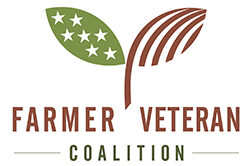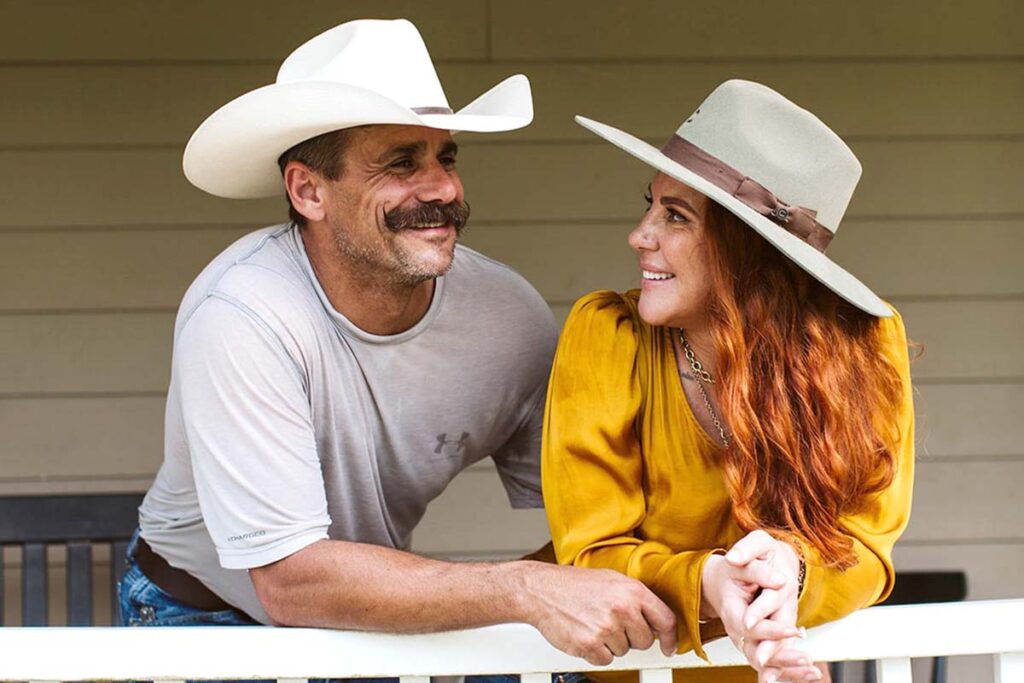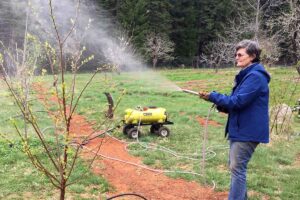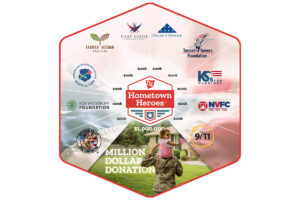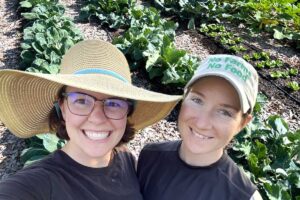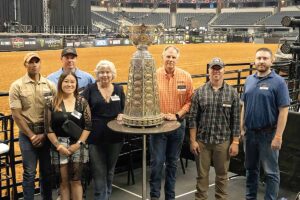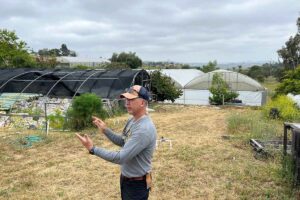Lauren Simmons considers herself an open book, and she’s more than willing to share the tales of her travails in agriculture if it can help another farmer.
The California-born Coast Guard veteran now finds herself working the Brownings Homestead in Kentucky, a move she never dreamed she’d make while growing up in a condo in the suburbs of Sacramento.
“A relative city girl,” is how she describes herself. “I joined the Coast Guard and was in for a rude awakening!”
Her first duty station was in Brookings, Oregon, at a surf unit. “(It was) a town of 4,000 people that were mostly fishermen and loggers and over an hour round trip to the nearest Walmart,” she said. “It truly shaped me and taught me the fortitude and discipline I desperately needed.”
After that, she had a permanent change of station Coos Bay, Oregon, to an air station, followed by Training Center Petaluma, California for HS-A school (medic training), and finally Aguadilla, Puerto Rico, at an air station.
“The first half of my career was search and rescue, and law enforcement at Chetco River,” she said. “A surf unit is specific to the Northwest Coast where the bar, or river mouth, can be restricted. We operated the 47-foot motor lifeboat, which has the ability to re-right itself should it be capsized by large waves.
“The second half of my term I served as one of the base medics and worked at the clinic of an OCONUS (outside continental U.S.) unit, so we also were able to treat civilians/families of service members from 6 months old to 60 years old.”
Coast Guard service isn’t like the other military branches, she noted.
“The Coast Guard is really different in that it doesn’t have the budget or resources of the (Department of Defense), so we are kind of this self-contained stepchild of the military branches,” she explained. “On any given day I could be mowing the lawn, or pouring asphalt for the station’s new parking area. I could be boarding fishing vessels with a gun belt checking their CFVSA (Commercial Fishing Vessel Safety Act permit), or I could be throwing a heaving line attached to a P6 pump to save a sinking vessel. It’s kinda wild all the things they require of you.”
Military Background
Lauren has a long line of military service on both sides of her family. But none in farming, she said.
“My Mom and Dad were both Army; they met on a (Military Airlift Command) flight to Hawaii,” Lauren said. “I think my Grandpa Larry may have been kicked out of the Air Force? He was an orphan from a very young age, a rough-and-tumble guy who didn’t like to be told what to do.
“I am actually a lot like him, and I think that is why I love entrepreneurship so much. When I was nearing the end of my six-year term I started researching schools for agriculture.
“Over the last decade my passion for it grew as I read book after book on our food systems. I decided I wanted to be a farmer, even with ZERO previous experience. Seriously, I had never even grown a tomato. I enrolled at the University of Kentucky for their sustainable agriculture degree, specifically because they required a 250-hour, on-farm apprenticeship and I wanted hands-on experience.”
It was her first time in Kentucky.
“Before I knew it, I had a horse, we bought a little land, and we lived in a 38-foot, fifth-wheel camper for three years with three dogs and three horses while I finished my degree.”
Why Kentucky?
For someone who grew up on the West Coast, a move to Kentucky probably seemed odd. Lauren Spencer last year married Drew Simmons, who grew up in Texas, and later lived in Florida and Puerto Rico.
“Drew and I always thought we would move,” she said. “That’s part of the reason for spending so much time in the camper; we didn’t want to waste our money on rent.
“We met in Puerto Rico and spent all of our time in the water. I taught scuba diving, and he loves to kiteboard. I’m terrible at surfing. … But nonetheless, we assumed we would end up in some place like North Carolina. He works out of New York, so we needed to be relatively close for his commute, but we still wanted the outdoors and to be as far away from the city as possible.
“After three winters in the camper I had had enough. We sat for hours in a local coffee shop searching Zillow with only two requirements: our home had to be a log cabin, and it needed to be halfway between our commutes. That is how we ended up in Harrison County, and boy, did God have a hand in that decision! Truly this is where we are meant to be.”
They live outside Cynthiana, the county seat, about 45 minutes northeast of Lexington.
Lauren and Drew have 104 acres on which they raise crops and livestock.
“It is just myself and Drew, and that is when he is home,” Lauren said. “He is an airline captain for JetBlue. He flies the A320 and A321 and commutes to and from New York City from our home in Kentucky, so he is gone a lot.
“We try to squeeze as much work in together as we can when he’s here for a few days, but he is also trying to recover from red-eye flights and lack of sleep during that time. We need more hands on the farm. We have tried to hire a few people, but they just can’t hack it. Nowadays, it seems even teenagers want $20 to muck stalls and that simply isn’t sustainable for any small business.”
Lauren has gotten used to holding down the fort alone.
“I take care of all of the animals, and I am in charge of when and how to grow our family business as well as all our farm operations,” she said. “But let’s be real here: Drew operates all of our tractors, attaches implements, moves round bales, hauls the 25-foot trailer, etc. However, I do all the heavy lifting on the ground, so there’s that…”
The Business
The couple has had great success with their Brownings flower truck. Browning is Drew’s middle name, which comes from his grandfather, James Calvin Johnson, a naval pilot during World War II who was known as “Brownie.”
“He was one of those incredible and influential people and we want his legacy to live on,” the Brownings Homestead website says.
“We had to take a huge step back from the most profitable part of our business — the flowers,” Lauren said. “Our flower truck was in high demand and we were executing high-end weddings with elaborate installs, but it is just simply too much when you are only one person. So for my mental health and the protection of my family’s time, we had to put a stop to that part of the business, which was a really difficult decision to make.
“We are slowly stepping away from flowers and expanding our homestead, which was the original goal even when I was dreaming about this lifestyle while living in Puerto Rico. Self-sufficiency is the goal, and I am always striving to implement permaculture practices.
“We currently have an A2A2 milk cow that just bore us a sweet heifer calf, and we are raising our first meat steer. We recently added Kunekune pigs to our homestead for pork production. We have laying hens and Alpine dairy goats for milking, and we round that off with four horses for trail riding and calf roping, and five dogs, some of which Drew uses for hunting.
“We also expanded our gardens and are growing and raising all kinds of fruits, vegetables and herbs that I have taught myself how to can and preserve, and am learning herbalism while making tinctures, salves, etc., for our home’s apothecary and first line of defense. We both appreciate having control over our food and I love learning how to make even our basic staples like cheese, bread and coffee creamer from scratch.”
The homestead’s original property was 43 acres, but during Covid the land they shared a fence line with came up for sale.
“We were blessed to be able to add another 60-plus acres, and with the lower interest rate actually reduced our monthly mortgage payment,” Lauren said. “Drew actively tends to those wooded acres, planting food plots for the deer, and turkey for hunting.
“Our future goals include Katahdin sheep, mushroom production, fruit trees, perennials, meat rabbits, raising quail, and intensive pasture management for rotational grazing. But first we have to implement a lot of fencing, and that is very expensive.”
Fellowship Fund
Thankfully, they were able to get some help in that area thanks to the FVC’s Fellowship Fund.
“Drew and I have been doing our own fencing for years,” she said. “We made the mistake of having a fencer install a pen around our chicken coop when we first moved here and it cost $5,000! Who has that kind of money?
“So we did what little we could with what we had. We slowly built up the equipment we needed like a fence stretcher, but you simply cannot hand-dig 200 post holes in rocky, clay soil on 30-degree slopes. It was an impossible job and we certainly didn’t have the $6,000 to invest in a post driver.
“We got the grant. I couldn’t believe it. We are so grateful to the FVC and Tractor Supply. God is so good at blessing our family and we immediately were able to implement nearly 1,000 feet of fence!
“Now we can tackle fencing off the nine pastures we have planned with just the two of us. This will enable us to improve the health of the soil and grasses, add other animals to our operation, fence off riparian buffers around the creeks, and repair the old, rotted horse board fencing that is desperately in need of replacing.”
Social Outreach
Beyond the literal growth of the farm, Lauren has been growing her reach to others via social media through Facebook and Instagram.
“Oh, social media. I have a love/hate relationship with it,” she said. “Truth be told, I would love to live as a hermit where no one would know what we are up to, and I didn’t waste my time on posts for people I have never met. “But it is a necessary evil if you want to run a business. This is how people find you. And now, more so than ever, people want to know who they are purchasing from. They are invested in learning your story and supporting you and your family and I find there is value in that.
“It’s also not all bad. I have made connections I never would have been privy to before this digital age. I have ‘pen pals’ and people I can call on when I have a question. Customers are very loyal and they will come to your aid when you are in need.
“A couple years ago we had an accident where our flower trailer tipped over and was damaged and people I have never even met rallied, started a GoFundMe without my knowledge, and donated so we could fix this very integral part of our business.”
Lauren also earned a degree in agricultural education. “I am a teacher by trade, so I really like to share what I am learning,” she said. “We got our start with my posts titled ‘Confessions of a First Generation Farmer,’ where I showed the good, but mostly the bad and the ugly. It’s here where people can learn from our mistakes so they don’t make the same ones, hopefully saving them time, money and headache. I don’t mind being vulnerable and people really appreciate an account that does that.”
Rural Living
Both said they enjoy their life in Kentucky.
“My biggest enjoyment is the autonomy of this rural way of life,” Lauren said. “I have the ability to dictate my day, to decide what we add to the farm, I get to be a caretaker of the land and the animals and to me there is no greater job.
“I also really appreciate the hard work that it takes. I like to work and I love to learn. It feels like this lifestyle is dying and that makes me want to work even harder to keep it alive. Should we be blessed to have kids one day, this is how I want to raise them.
“I believe everyone should have the opportunity to train a horse, to witness a calf being born, to milk a goat and drink that milk raw to taste the difference, and to pull dinner straight from the garden. I take so much pride in choosing a life that is difficult because I find that hard things are the most rewarding.”
Drew offered a similar — albeit briefer — sentiment.
“I love that our dogs get to run free,” he said. “And I love to hunt my own land.”
Lauren noted that Drew is a man of few words. “But he is quite the caretaker,” she added. “He is a cowboy, and he loves to ride his horses on our trails, cultivate the fields, host dove hunts each September, drink the milk from our cow, and he spends many, many early mornings and late evenings in the deer stands and turkey blinds.”
Sharing her farming experiences with others is important to her, she said.
“I am an open book,” Lauren said. “I have applied for multiple grants. I have killed all the plants. I’ve taught myself everything because a college degree in ag turns out doesn’t prepare you for much, and I’ve made all the mistakes along the way.”
She encourages farmers, especially farmer Veterans to reach out via email at browningsflowertruck@gmail.com.
I love connecting with people, but especially other fellow farming Vets,” she said. “We are a real niche, you know, and we need to stick together! Oh, and Drew has always wanted to host a dove hunt just for Vets, so if you are in the area and are interested let me know!
Check out Brownings Homestead on Facebook, Instagram or their website,
